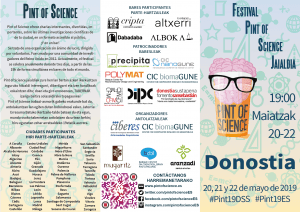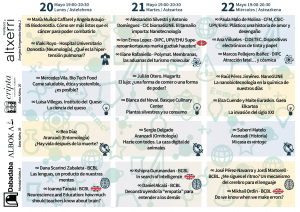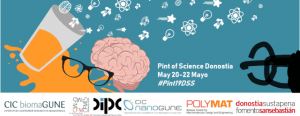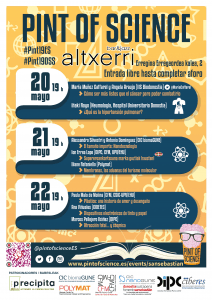Pin t of Science 2019 in Donostia-San Sebastián
t of Science 2019 in Donostia-San Sebastián
20-22 of May
- CFM supports the festival organized yearly by CIC biomaGUNE at Donostia / San Sebastián, filling up our city with science. Cheers!!
- Two of the talks will be given by CFM researchers Ion Errea (ERC grantee and UPV/EHU Associate professor) and Paula Malo (Ikerbasque Fellow Researcher at CFM)
- + INFO: pintofscience.es
You´ve got at least two dates!
Altxerri Bar&Jazz, Erregina Erregeordea Kalea, 2,
Donostia 20003
Donostia 20003
21 May
19:00-20:30
Supereroankortasuna marka guztiak hausten!
Ion Errea Lope (Fisika Aplikatua 1 Saila, UPV/EHU, Materialen Fisika Zentroa, Donostia International Physics Center)
’Supereroaleek korronte elektrikoa inongo galerarik gabe garraia dezakete. Ametsetako materialak dira! Baina zoritxarrez oso tenperatura baxuan soilik mantentzen dute propietate bikain hau. Zientziaren erronka nagusietako bat da giro-tenperaturako supereroaleak lortzea. Azken urteotan ulertu dugu hidrogenoz osaturiko konposatuetan ia giro-tenperaturako supereroankortasuna lortu daitekeela. Baina, egiari zor, oso presio altuetan bakarrik.
22 May
19:00-20:30
Plástico: una historia de amor y desengaño
Paula Malo de Molina (Centro de Física de Materiales (CFM, CSIC-UPV/EHU))
El material que ha revolucionado la industria y nuestro estilo de vida en el siglo XX ahora nos invade. El plástico ha hecho posible los viajes al espacio y al fondo del océano pero sus residuos están contaminando nuestros bosques, nuestros mares y nuestra comida. ¿Qué avances científicos y tecnológicos hicieron posible su versatilidad y ubiquidad? ¿Por qué tardan tanto tiempo en degradarse? ¿Qué podemos hacer?
About Pint Of science
The Pint of Science festival aims to deliver interesting and relevant talks on the latest science research in an accessible format to the public – mainly across bars and pubs. We want to provide a platform which allows people to discuss research with the people who carry it out and no prior knowledge of the subject is required. It is run mainly by volunteers and was established by a community of postgraduate and postdoctoral researchers in 2012.
Really international
The main festival takes place annually over three days in the month of May and simultaneously in hundreds of venues across the world. Each country holds their main events on the same days, bringing the scientific community together.







